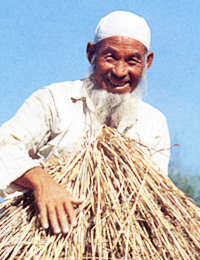 The Bonan is one of China's smallest ethnic minorities, with only 12,212 people (by 1990). They mainly cluster in the area around Xunhua County in Qinhai Province and Linxia County, southwest of Gansu Province.
The Bonan is one of China's smallest ethnic minorities, with only 12,212 people (by 1990). They mainly cluster in the area around Xunhua County in Qinhai Province and Linxia County, southwest of Gansu Province.
Its language belongs to the Mongolian Austronesian of the Altaic Phylum and is close to that of the Tu and Dongxiang ethnic minorities. But due to frequent daily contacts and exchanges with the neighboring Han people, they've evolved to using Chinese as their main communion tool.
Judging from their legends, language features and customs, many of which were identical with those of the Mongolians, the Bonan minority seems to have taken shape after many years of interchanges during the Yuan and Ming (1271-1644) periods between Islamic Mongolians who settled down as garrison troops in Qinghai's Tongren County, and the neighboring Hui, Han, Tibetan and Tu people. They used to be called Bonan Huis. In 1950 it was renamed the Bonan ethnic minority according to their own will.
The Bonans are mainly engaged in agriculture, stock raising and handicraft as supplement. Baoan people are good at dancing, singing and playing the stringed and woodwind instrument. Their dances have some characteristics of that of the Tibetan's. The Bonan knives, a cottage industry, are famous all over China for their beauty and sturdiness.
The Bonans believe in Islamic. In daily life and social customs, they share some living styles with the Mongolian nationality in the local area, such as rassling. The main festivals of the Bonan ethnic group include the Corban Festival, the Almsgiving Festival and the Kaizhai Festival.
